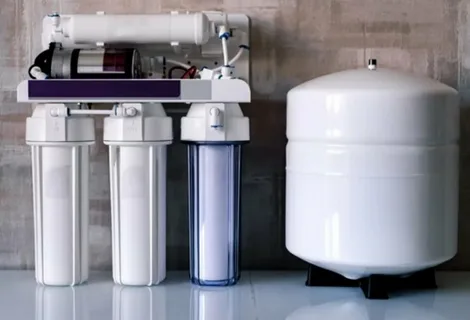Choosing the Best Water Filter for Home: A Complete Guide

Clean water is essential for good health, yet many of us take it for granted. With rising concerns about contaminants in tap water, choosing the right Water Filter for Home use has never been more important. Water filters not only improve taste and odor but also provide peace of mind knowing that you’re drinking safe, clean water. This complete guide will navigate you through everything you need to know about selecting the best water filter for your home.
What Is a Water Filter and Why Is It Important?
A water filter is a device designed to remove impurities and contaminants from your drinking water. It works by using physical barriers, chemical processes, or biological methods to improve the quality of water you consume. The importance of a water filter cannot be overstated. Tap water can contain various pollutants like chlorine, lead, bacteria, and even pesticides. These substances pose health risks that can accumulate over time.
Using a reliable filtration system not only enhances the taste but also ensures that you're providing safe drinking options for your family. In an age where health consciousness is rising, having access to clean water should be a priority in every household. Investing in the right filter means taking proactive steps towards better hydration and overall well-being. Clean water sets the foundation for healthier lives and happier homes.
Understanding Different Types of Water Filters
Water filters come in various forms, each designed to tackle specific issues. Understanding these types is essential for making the right choice. Activated carbon filters are common in homes. They effectively remove chlorine and improve taste. However, they may not eliminate all contaminants. Reverse osmosis systems provide a more thorough purification process. These systems push water through a semi-permeable membrane, removing dissolved solids and impurities. They’re perfect if you have serious quality concerns.
UV purifiers use ultraviolet light to kill bacteria and viruses without chemicals. This technology works well alongside other filtration methods but doesn't remove physical particles or heavy metals. Ceramic filters offer another option with tiny pores that capture sediments and microorganisms. They're durable and often used as backup solutions. Pitcher filters are portable and convenient for everyday use but might require frequent replacements to maintain effectiveness. Each type serves different needs—it's vital to assess what suits your household best.
Factors To Consider When Choosing a Water Filter
Choosing the right water filter involves several key factors. First, consider your specific water quality needs. Different filters target various contaminants, so knowing what’s in your water is essential. Next, think about the filter type that suits your lifestyle. Options range from pitcher filters to under-sink systems and whole-house solutions. Each has its advantages based on space and convenience.
Filter capacity matters too. Assess how much filtered water you need daily for cooking and drinking. Don’t overlook maintenance requirements either. Some filters require frequent changes or cleaning, which can affect long-term costs and usability. Evaluate certifications like NSF/ANSI standards to ensure the filter effectively removes harmful substances while providing peace of mind regarding safety.
Water Purifier for Home: Finding the Right Solution for Safe Water
Water Purifier for Home is essential for ensuring you have access to clean drinking water at home. With various options available, choosing the right one can be overwhelming. Start by considering your specific needs. Are you dealing with hard water, or is your main concern removing contaminants like lead and chlorine? Understanding what’s in your tap water will help narrow down choices.
Next, think about the type of purifier that suits your lifestyle. Options range from countertop models to under-sink systems and even faucet attachments. Each has its pros and cons regarding installation, space requirements, and filtration methods. Don’t forget maintenance aspects as well; some filters may require frequent replacement while others offer longer-lasting solutions. Evaluating these factors ensures you'll select a system that not only fits seamlessly into your life but also provides peace of mind with every sip you take.
Benefits Of Having a Water Filter at Home
Having a water filter at home offers an array of advantages that go beyond just taste. Clean, filtered water can enhance your overall health by reducing exposure to harmful contaminants found in tap water. Many filters remove chlorine and heavy metals, contributing to better hydration.
Improved Taste and Odor
Water filters remove chlorine, sediment, and other impurities that can affect the taste and smell of your tap water, making it more palatable and enjoyable to drink.
Healthier Water
Filters can remove harmful contaminants like bacteria, viruses, heavy metals (like lead), and pesticides, reducing the risk of waterborne illnesses and improving overall health.
Cost Savings
Over time, filtering your own water can be more economical than buying bottled water. While there's an initial investment in the filter, it pays off in the long run and reduces plastic waste.
Convenience
Having a water filter at home provides easy access to clean, filtered water whenever you need it. No more trips to the store for bottled water or worrying about running out.
Common Contaminants Found in Tap Water
Tap water can contain a variety of contaminants that may not be visible to the naked eye. Understanding these impurities is crucial for ensuring safe drinking conditions. Chlorine is commonly used as a disinfectant in municipal water systems. While it helps kill harmful bacteria, it can leave an unpleasant taste and odor. Heavy metals like lead or mercury occasionally leach into water supplies from old pipes or industrial runoff. Even small amounts can pose serious health risks over time.
Pesticides and herbicides are another concern, particularly in agricultural areas. These chemicals can seep into groundwater and affect local tap water quality. Fluoride, often added to promote dental health, has sparked debate regarding its safety levels in drinking water. Moreover, microplastics have emerged as a modern contaminant challenge. Studies suggest they could be found even in treated tap water sources. Understanding what’s potentially lurking in your glass underscores the importance of using a reliable water filter at home.
How To Test Your Water Quality
Testing your water quality is essential for maintaining a safe home environment. Start by collecting a sample from your tap in a clean, clear container. Ensure you let the water run for about five minutes before filling it to get an accurate reading. You can purchase DIY test kits online or at local stores. These kits typically measure pH levels, chlorine content, hardness, and common contaminants like lead or bacteria. Follow the instructions closely for reliable results.
For more comprehensive testing, consider hiring a professional service. They can analyze various impurities that might not be included in standard kits. It's also wise to check with your local water utility for annual reports on water quality in your area. This information provides insight into potential issues affecting community health and safety. Regular testing helps ensure you're drinking safe and clean water every day.
House Water Filters: Ensuring Clean and Safe Water for Your Entire Home
House water filter serve as a safeguard for your entire home. They treat the water coming into your plumbing system, ensuring that every tap delivers clean, safe drinking water. These systems can reduce contaminants like chlorine, lead, and other impurities. When you install a house water-filter, you're not just protecting yourself; you're also safeguarding your family’s health. With various models available—such as reverse osmosis or carbon filtration—you can find one that fits your needs. Some systems even come with additional features like UV sterilization to eliminate bacteria.
Maintenance is straightforward; regular filter changes keep the system efficient. Investing in a whole-house solution means enjoying peace of mind while filling up glasses or cooking meals without worrying about quality. Transforming the way you consume water enhances overall well-being and promotes healthy habits throughout the household.
The Cost of Owning a Water Filter Vs Buying Bottled Water
When weighing the cost of owning a water filter versus buying bottled water, several factors come into play. Water filters often have an upfront investment but can provide significant savings in the long run. A quality water filter may range from $50 to several hundred dollars, depending on the type and brand. This is a one-time purchase that can last for years with proper maintenance. Replacement cartridges are typically needed every few months, adding minimal ongoing costs.
On the other hand, purchasing bottled water adds up quickly. A single bottle can cost anywhere from $1 to $3 or more, particularly if you buy it frequently. Over time, those small purchases become substantial amounts—often surpassing the initial expense of a good filtration system. Moreover, it's essential to consider environmental impact. Using a filter reduces plastic waste significantly compared to continually buying bottled beverages.
Maintenance And Replacement Costs of Water
Maintaining a water filter is crucial for its effectiveness. Regular upkeep ensures that the system continues to deliver clean, safe water. Replacement costs can vary significantly based on the type of filter you choose. Some systems require frequent cartridge changes, while others may last longer before needing attention. Consider your usage habits. Families with higher consumption might find themselves replacing filters more often than individuals or couples.
Don’t forget to factor in installation costs if you're opting for a whole-house system. Hiring professionals can add to your overall expenses but guarantees proper setup and functionality. Always check if your chosen brand offers warranties or service plans. Investing in reliable support can save you money in the long run by preventing costly repairs or replacements.
Conclusion
Choosing the right Water Filter for Home use is a pivotal decision. With so many options available, it’s essential to assess your specific needs. Understanding what contaminants might be in your tap water can guide you towards a suitable model. Each type of filter has its own strengths and weaknesses, making knowledge key. Consider factors like installation, maintenance costs, and long-term benefits as well. A thoughtful approach will help ensure that you invest wisely.
FAQs
What types of contaminants can a Water Filter for Home remove?
A good quality Water Filter for Home can effectively remove bacteria, viruses, chlorine, lead, sediment, and other harmful substances commonly found in tap water.
How often should I replace my water filter?
Replacement frequency depends on the type of filter you've chosen and the usage level. Generally speaking, carbon filters need replacement every 6 months to a year.
Are there specific certifications I should look for when buying a water filter?
Yes! Look for certifications from organizations like NSF International or the Water Quality Association (WQA). These labels ensure that the product has been tested for safety and effectiveness.
Can I install a whole house filtration system myself?
While some homeowners opt to install their own systems as DIY projects, it’s often advisable to consult or hire professionals to ensure proper installation and optimal performance.
|
Related Business Listings |





